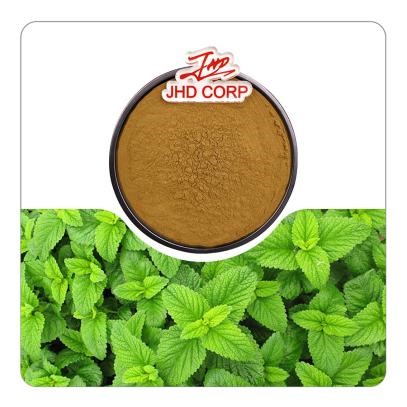Welcome to JHD Nutrasource!
Shop
Lemon Balm Extract
Lemon Balm Extract is derived from the lemon balm plant (Melissa officinalis), a member of the mint family known for its lemony scent and a variety of health benefits. The extract typically contains volatile oils, flavonoids, and other bioactive compounds that contribute to its therapeutic properties.
Description
| Product Name | Lemon Balm Extract |
| Appearance | Brownish Yellow Powder |
| Specification | 20:1 |
| Test Method | TLC |
| Source | Melissa officinalis L. |
| Certificate | ISO/Halal/Kosher/BRC |
Functions
- Calmative and Anti-Stress Effects: Lemon balm is often used to reduce stress and anxiety, and may help improve mood and promote relaxation.
- Neuroprotective Properties: Some studies suggest that lemon balm extract may have neuroprotective effects, potentially benefiting cognitive function and memory.
- Antimicrobial Activity: The extract has shown antimicrobial properties, which can be useful in inhibiting the growth of certain bacteria and fungi.
- Gastrointestinal Health: Lemon balm may help soothe the digestive tract and alleviate symptoms of gastrointestinal issues like indigestion and bloating.
- Sleep Aid: It is sometimes used to improve sleep quality, particularly in cases of insomnia related to stress.
Applications
- Dietary Supplements: Lemon balm extract is commonly used in supplements for its calming effects and to support cognitive health.
- Tea: It is a popular ingredient in herbal teas, often consumed for relaxation and to aid digestion.
- Cosmetics and Skin Care: The extract’s antimicrobial properties make it suitable for use in cosmetics and skin care products, potentially benefiting acne-prone skin.
- Aromatherapy: Lemon balm essential oil is used in aromatherapy for its calming and uplifting effects on mood.
- Food and Beverage Flavoring: The extract can be used to flavor foods and beverages, adding a refreshing lemony taste.
- Pharmaceuticals: In some cases, lemon balm extract may be incorporated into pharmaceutical products, particularly those aimed at improving mood and cognitive function.
- Traditional Medicine: It has been used in traditional medicine for centuries to treat a variety of ailments, including digestive issues and insomnia.

